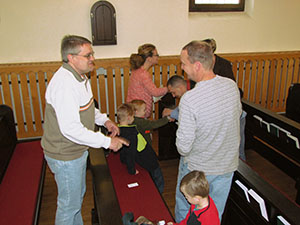
One of the volunteers at Daenner Chapel drives 100 miles every week to attend church services.
Christian Führer, a German national and a member of the Ministry Advisory Council for Daenner Chapel’s Chapel Next, greets the congregation every week as they walk through the doors.
“Christian is the first person you see when you arrive at the chapel,” said Army Reserve Chaplain (Lt. Col.) Brian Harki, the 7th Civil Support Command chaplain. “You would never guess that he lives the furthest away. Most people don’t know Christian very well because he is always more interested in caring for others than talking about himself.”
Daenner Chapel is the third American church Füh-rer has attended since the mid-80s.
Back then, all the American institutions in Germany were wide open, and the Germans could enter and join the Americans during worship services, Führer said.
He first became interested in American culture when, as a teenager in Mannheim, he rode his bicycle onto the American base. He followed cars into Benjamin Franklin Village, where he found “a wonderful American microcosm.”
The base was open, and he was able to explore and learn about the United States and its people.
“There cannot be many people like Christian who has served American chapels as a foreign national as long as he has,” Harki said.
As he got older, he started volunteering at the local USO. One of the other volunteers was the wife of an American chaplain. She invited him to come to the church.
“It became a hobby, a passion and a calling,” Führer said. “Once I got attached to that church, I never let go.”
He started attending services in Mannheim, which had approximately 400 people attending protestant services.
At first, Führer stayed in the back, because he didn’t know English very well. After a while, however, he joined the chorus and rang bells during services. He also became a chaperone for the youth group and then an usher and greeter.
Führer continued attending services at the church in Mannheim until it closed May 6, 2012. About 40 people attended the last service — most of them were military retirees.
“It was a heartbreaker for me,” he said.
For many years, new Soldiers would arrive every August and September to replace others who had moved on. The base and the church, however, stopped getting new Soldiers in 2009. The existing congregation slowly moved away.
“After 2009, in church we had nothing but farewells,” Führer said.
When the Mannheim church closed, he volunteered and attended services in Heidelberg for a year until the post closed Aug. 18, 2013.
It was after that when he began making the 85 km trip to Kaiserslautern from his home in Neulussheim every week. He became involved as an usher and greeter and a member of the
Ministry Advisory Council.
When he isn’t volunteering for the church, Führer is teaching at the Duale Hoch-schule Baden-Württemberg in Mannheim as a college professor, and head of the Service Marketing Department at the School of Business.
“I see Christian as the bridge that touches both countries, the U.S. and Germany, with church as the common place in the middle,” Harki said. “Christian is truly valued and appreciated.”
Why does Führer keep coming to American churches despite the closures and the long drives?
“After all these years, my God speaks English,” he said.
American churches, especially in the military, are very authentic, he said. Especially after the deployments in the ’90s through today, the Soldiers and their chaplains have come through some very tough experiences.
“Army chaplains are very authentic people,” Führer said.
In addition, he sees himself as a continuous factor in a congregation that changes, providing continuity from which newcomers can draw.
“If I can help out and fill that gap, for me it’s a privilege and a blessing,” he said.


